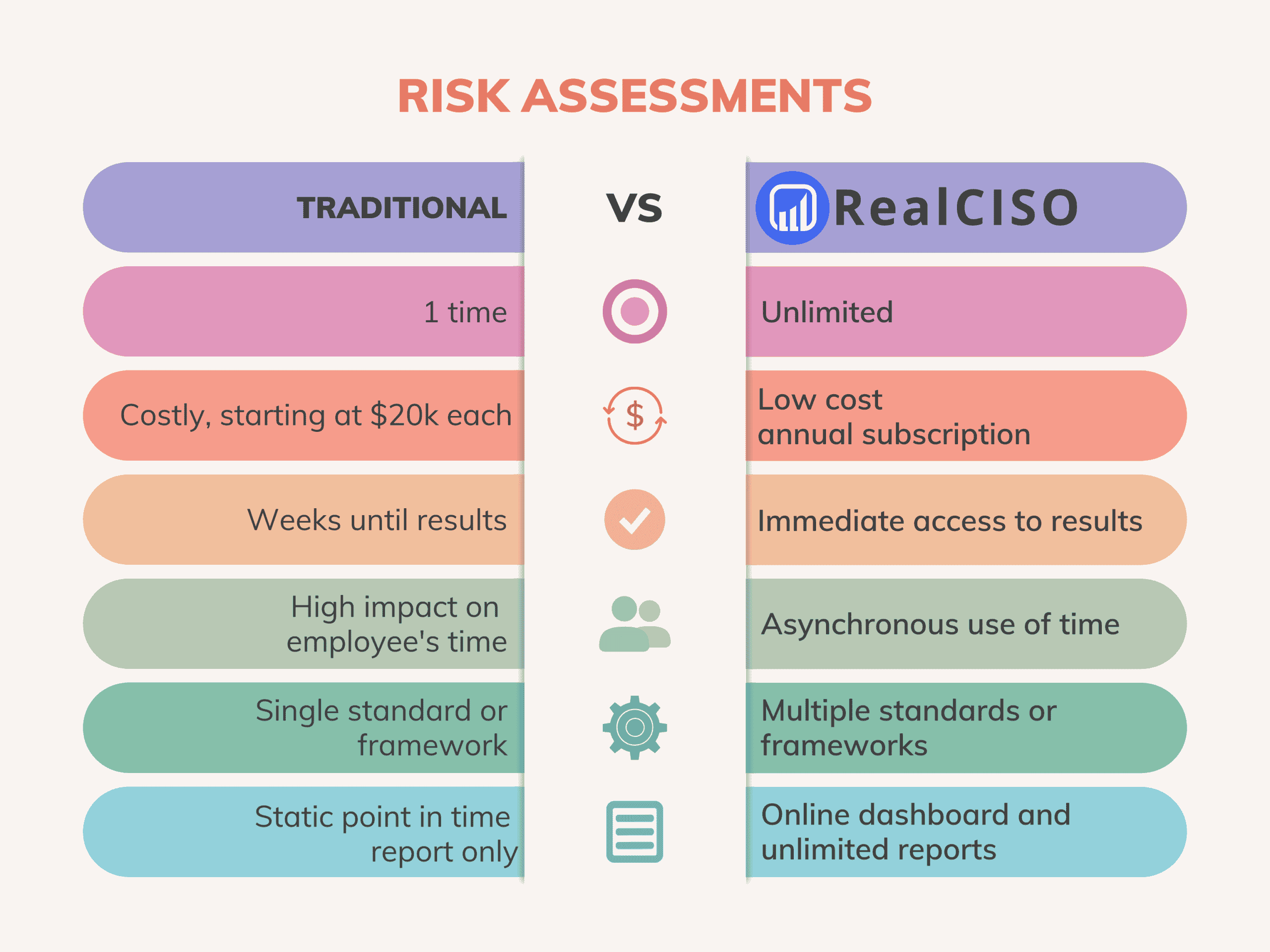
Traditional Risk Assessments vs A Purpose Built SaaS Platform
Organizations are constantly confronted with the challenge of safeguarding their digital assets against an array of threats. This necessitates a robust approach to risk assessment, traditionally fulfilled through consultant-led evaluations. However, the advent of specialized Software as a Service (SaaS) platforms, exemplified by solutions like RealCISO.io, marks a significant shift in how businesses can address these challenges more effectively and efficiently.
This article contrasts traditional risk assessments with the advantages offered by a purpose-built SaaS platform, shedding light on the operational and strategic benefits of the latter.
Traditional Risk Assessments
Traditionally, risk assessments in cybersecurity have been predominantly consultant-led endeavors. These processes are characterized by their intensive demands on time, often stretching over prolonged periods due to the necessity of scheduling meetings, coordinating with multiple stakeholders for information and evidence gathering, and the sequential nature of the tasks involved. The time from the initiation to the conclusion of such assessments can be substantial, leading to delays in implementing critical security measures.
Moreover, traditional cybersecurity assessments are typically point-in-time analyses. They offer a snapshot of an organization’s security posture at a specific moment, without the provision for continuous reassessment. This is a critical limitation, especially considering the dynamic nature of cyber threats and the ongoing changes within an organization’s IT environment. After implementing recommended remediations, organizations often lack the means to reassess their posture without incurring additional costs or undertaking another full-scale assessment.

Financial Impacts
The financial implications of consultant-led risk assessments are another significant consideration. Costs can start from around $20,000 and may escalate to over $100,000 for larger organizations. This investment pertains to a single assessment, with no provision for follow-up evaluations to gauge the effectiveness of implemented remediations. This aspect alone makes traditional assessments a less viable option for many organizations, especially those with limited budgets or those requiring frequent reassessments due to the nature of their operations or industry regulations.
Furthermore, the timeline for obtaining initial results from traditional assessments can be another point of contention. The delay in receiving actionable insights can dissipate the momentum and focus of involved teams, undermining the overall urgency and importance attributed to the cybersecurity measures under consideration.
Additionally, traditional risk assessments typically align with a single standard or framework, limiting their scope. Organizations today, however, often need to comply with multiple regulatory requirements and would benefit from a comprehensive assessment that simultaneously evaluates their compliance against various frameworks. This not only streamlines the assessment process but also provides a more holistic view of an organization’s cybersecurity readiness.
Purpose-built SaaS Platforms
Contrastingly, purpose-built SaaS platforms like RealCISO.io are designed to address these challenges head-on. These platforms offer a streamlined, efficient approach to cybersecurity risk assessments, significantly reducing the time and resources required. They enable continuous risk monitoring and assessments, allowing organizations to quickly gauge the effectiveness of their remediation efforts and adjust their strategies in real-time. Financially, they represent a more cost-effective solution, eliminating the need for expensive consultant-led assessments and offering the flexibility to reassess security postures as needed without additional costs.
Moreover, SaaS platforms provide the agility to assess compliance against multiple standards simultaneously, offering a comprehensive understanding of an organization’s cybersecurity strengths and vulnerabilities. This multi-framework capability facilitates a more strategic approach to cybersecurity, ensuring organizations are not only compliant but also resilient against a broad spectrum of threats.
Conclusion
In conclusion, while traditional risk assessments have played a crucial role in cybersecurity, the dynamic nature of cyber threats and the evolving regulatory landscape necessitate more flexible, efficient, and cost-effective solutions. Purpose-built SaaS platforms like RealCISO.io represent a significant advancement in this domain, offering organizations the tools they need to navigate the complexities of cybersecurity with greater agility and confidence.